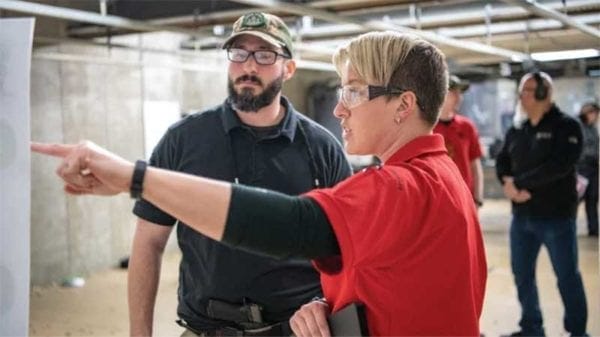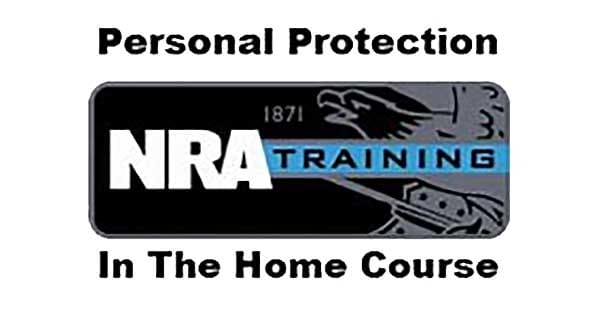Opinion

New Jersey – -(AmmoLand.com)- A few months ago I was wrapping up a training class with one of my students. In fact, the discourse that usually follows after completing a basic safety and use training course on firearms includes “What else do you teach? What is next? What about self-defense training?”
I’ve been an NRA Certified instructor since 2014 and have had the chance to train several people over the years. My emphasis has always been, whether teaching an NRA class or a customized class to fit the needs of my students, safety, and then following that, marksmanship. In short, teaching the gun safety rules, the parts of firearms, how they work, the loading, unloading, checking of firearms, and focus on the fundamentals of shooting.
My student, like many people out there that are first-time gun owners in our current state of affairs in the United States, was interested in introducing firearms into his life for the purpose of self-defense. After getting a student comfortable and then meeting the outlined requirements of whatever training course I was teaching, I tell them to get out there and practice, practice, practice. I also implore them to seek more training (if not from me, another instructor to get a different perspective).
That one particular day, I said to my student “Well, we can schedule something if you like after you do some practicing. And if you want a more concentrated focus to be on the self-defense aspects of shooting, not just standing erect, putting holes into paper, I can write a course for you.”
My mentality was that if he was serious about this, which he seemed to be, other students who have asked similar questions could benefit from me having such an offering. The student said “Oh no, you don’t have to put something together special just for me. I just know you teach other classes too.”
NRA Firearms Training Programs
He was right, my certifications with the NRA include Basic Pistol, Basic Rifle, Basic Shotgun, Personal Protection Inside the Home, and Refuse to Be a Victim. The NRA Basic Pistol class and way of doing things really does offer a lot to new gun owners in the way of competency and safety training. The class is very inclusive and exhaustive, covering just about everything someone needs to know to enter this world with confidence and proficiency. What’s next after the NRA Basic Pistol Class? In the case of my student seeking training in-home self-defense, naturally, the NRA Basic Personal Protection Inside the Home program would follow.

The NRA Basic Personal Protection Inside the Home class is fantastic! Like most programs the NRA offers, this one is very comprehensive and covers a good deal of ground. I really loved going through my training to become an instructor for this class years ago. The drills we did as instructor candidates were more interesting to me and going through the program materials looking through the lens of an instructor offered valuable insight. The companion book that goes with the class is also very high quality and contains what a student would need to embrace the defensive mindset, and the book and class both go beyond the “bang bang” aspects of the subject matter. Things such as hardening your home and awareness techniques are covered. Like most self-defense programs, conflict avoidance is a key element. That avoidance can come in the way of different things you can do to, in, and around your home. It’s a good class and I recommend people take it.
This can be settled, I should introduce my student to the NRA Basic Personal Protection Inside the Home class. And I would agree with that summation, unequivocally, however, there is one very large and cumbersome aspect of teaching that class, and its Lesson III.
Lesson III is a part of the course that covers the legal aspects of firearm ownership and use.
What’s wrong with that, that’s good material to cover, no? Yes, that is fantastic material to cover! However, the NRA requires that instructors bring in a lawyer that specializes in that area of the law or a police officer with certain training to teach the lesson. I don’t know if any of you out there have checked out the rates to retain and use the services of an attorney for anything, but suffice it to say it can be very cost-prohibitive. Beyond the financial aspects of this, which an instructor will have to push onto their student(s), there is the matter of scheduling any guest presenters to cover this portion of the class.
Back to my student, that reason is the big “why” I suggested me coming up with a custom program for him to help him achieve his goals. Because it’s not practical at all, or cost-effective, to run Lesson III. So I do not offer this class. I would like to, but I don’t.
United States Concealed Carry Association (USCCA)
It was kismet, I was on social media shortly after that encounter with my student and a post popped up from a local instructor that I knew of. He runs his own training company, was fairly well known, and I’ve heard only good things about his classes through the grapevine. He was offering the United States Concealed Carry Association (USCCA) class to certify instructors in Concealed Carry & Home Defense Fundamentals. I started my research, dug into what such a certification would allow instructors to teach, called the instructor to discuss the class with him, and I called the USCCA’s training department to get information from them as well. This was the class I was looking for!
As a USCCA certified instructor in Concealed Carry & Home Defense Fundamentals, instructors can teach three premade classes: Home Defense, Concealed Carry, and Basic Handgun. USCCA sets the stage to give versatility to an instructor’s credentials. It does not stop at those three offerings. The USCCA allows instructors to make customized classes from their material pool and provided certain elements that are covered, the class is fully sanctioned by and certified by USCCA.
This was right up my alley! I can create my own custom classes to fit the needs of a particular student or group of students without having to reinvent the wheel. They’d also be eligible for a vetted certificate, which is important to some people (especially those seeking CCWs in certain states).
The USCCA training program is different from the NRA program in many ways. The principal way they diverge is right from the get-go. USCCA’s training objectives are geared towards those specifically wanting to learn to use their firearm for self-defense. Marksmanship is not so much put to the wayside, as much as the emphasis is on defensive shooting, and with that defensive accuracy. Everything in the class, whether it’s covering the safety rules and handling of firearms, shooting fundamentals, or practical shooting drills, are all conducted from a self-defense perspective.
The process of becoming a certified USCCA instructor includes the need to complete their online program prior to stepping foot in the classroom as an instructor candidate. I have had mixed feelings over the last several years concerning online training being part of one’s firearm education, however, my opinion has shifted to this being a positive way of doing things. In the past, I resisted forced changes to the NRA program but eventually grew to love their blended program (the NRA did make necessary changes to their program again due to numerous complaints about blended online/instructor lead training being the only way to teach Basic Pistol. Now they offer both; solely instructor lead and blended – a good move!). I logged into my required learning modules and got to work!

The online learning modules that USCCA provides are incredibly high quality. I was and am impressed with the amount of production value of everything that the USCCA puts out there. Whether it’s their books, online training, or slide presentations needed to teach a class, the material was created thoughtfully and thoroughly. I almost immediately noticed differences between the NRA way of doing things and the USCCA way of doing things. USCCA injects the concepts one would learn, and then some, in a Personal Protection Inside the Home Class, right in their basic level training classes. This is paramount to cater to their mission of teaching from a self-defense angle versus a marksmanship objective.
When I got to my instructor development class, I was greeted by my instructor and an assistant instructor. There were 3 other instructor candidates in the class. Once the class started, we did quick introductions. The participants were all experienced gun owners with the following backgrounds: A newly made NRA Instructor of retirement age, A former police officer that teaches martial arts pre-retirement age, and a gun enthusiast/informal instructor from South Africa that got his firearms training in Israel who was in his late 30’s early 40’s. This eclectic group proved to bring a lot to the table concerning varying viewpoints and experience levels.
The actual nuts and bolts behind the class were straight forward. Similar to the NRA, USCCA requires many simulated student/instructor scenarios, and working together is a key element to the success of the class. The materials that make up the slideshow are extracted from the same decks that an instructor would teach out of. This gave instructor candidates the chance to have absorbed the material when they took the online prerequisite class and also a closer more intimate read/interpretation of the concepts to be taught in the classroom. There was a shooting qualification that was paired with a simulated student/instructor dynamic and I found this to be superior to the NRA’s prequalification requirements. We were able to “learn by doing” as well as prove our proficiency all at once. The class was capped by an extensive multiple-choice exam which was reviewed at the end of the 2nd day.
Once we all high-fived everyone and congratulated each other as newly minted USCCA Instructors, we had private conferences with the training counselor. I don’t have access to the USCCA magic book of training trainers, so I cannot confirm if this is lock-step with the USCCA way or the way the independent trainer does things. Regardless, it was a great way to summarize our individual performance, receiving constructive comments from the instructor.
USCCA versus NRA Firearms Training
Looking at USCCA versus NRA, yes there are differences. The differences in the programs are not in opposition to another, but rather very complimentary. To distill these, as noted previously, one focuses more on marksmanship and the other self-defense. USCCA does not require an attorney or police officer to discuss use-of-force concepts, which is a plus. No actual “law” is specifically discussed. Things are approached from a force escalation vantage point versus a statutory one specific to any one jurisdiction. I feel the multimedia provided by USCCA is a different caliber than the NRA’s and depending on one’s taste, this can be a positive or negative. To me, it was a positive. The manual that complements the class is vivid, high quality, and in full color. It feels and reads like a high-quality textbook.
All in all, I was really glad I had a chance to participate in this class and become a certified USCCA instructor. My class experiences were idiosyncratic to our specific group, as I find these instructor development courses not only lean on the quality of the instructor (which was top-notch), but also the attitudes, professionalism, and willingness of the instructor candidates to participate. I learned several concepts and ways to connect with students which were new to me, as well as several self-defense defense items to add to my gambit of knowledge. The experiences you have will help give you the mindset to effectively teach the material.
If you are currently a firearms instructor or want to be one, take a look at the USCCA line of classes. Read up on and contemplate if their philosophies and the material covered fits your needs. There is a place for both the NRA way and the USCCA way of teaching responsible firearm use. Which program you gravitate towards or classes you decide to teach is going to be dictated by the needs of your students, as well as your own experience base.
If I had to give prospective instructors advice on this, become certified in both programs, and you’ll be equipped to handle a variety of educational needs in the shooting sports world.
AmmoLand News readers check out the many class selections from each group as there are so many great courses to take to improve your gun-sports and self-defense skills.
John Petrolino is a US Merchant Marine Officer, writer, author of Decoding Firearms: An Easy to Read Guide on General Gun Safety & Use and NRA certified pistol, rifle, and shotgun instructor living under and working to change New Jersey’s draconian and unconstitutional gun laws. You can find him on the web at www.johnpetrolino.com on twitter at @johnpetrolino and on instagram @jpetrolinoiii .


I concur completely with everything stated in this article. I am a USCCA instructor as well as being a certified NRA instructor for Pistol, rifle, shotgun and a certified shotgun coach. I have taught many NRA classes. As a former high school teacher, with over 40 years of classroom experience, I know curriculum and teaching methodology. The material is presented in a logical concise manner and employs excellent visual aids through the used of interactive PDF video. A logical learning progression would be to take the USCCA class after taking the NRA basic pistol class as, perhaps, the next step… Read more »
Well done. Focus is key. I have been a NRA Instructor and Coach for many years. Did so while I was still on active duty in the Marine Corps. I do not focus on personal defense. I focus on basics of marksmanship with rifle and pistol because that is what I have done for 45 some years and my students get the benefit of 45 years of competitive shooting and coaching competitive shooters in traditional marksmanship. The whole Concealed Carry and Personal Defense arena is relatively new unless you have been in Federal Law Enforcement. Even local agencies did not… Read more »